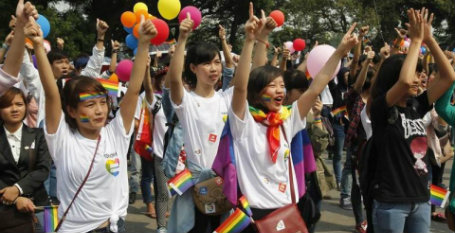"The family is one of the main perpetrators of violence and discrimination. (According to) Asian values, you control your family's sexuality, and it's a shame - a family shame - when one of your family members does not fit into... what society says is normal," Ging Cristobal of the Philippines-based International Gay and Lesbian Human Rights Commission (IGLHRC) told Thomson Reuters Foundation.
When LGBT people suffer violence from family members, there are few places they can turn to because there is already widespread social discrimination and the threat of violence against the LGBT community.
"Where do you go if you're being battered by your family? The service providers are also homophobic or transphobic," Cristobal said.
Cristobal was part of a panel speaking at the launch of the second phase of Being LGBT in Asia, a project dedicated to improving the lives of those facing abuse on the basis of sexual orientation. It is supported by the Swedish government, USAID and UNDP.
The second phase of the project aims to empower LGBT networks and organizations in China, Indonesia, the Philippines and Thailand.
The regional dialogue on LGBTI human rights and health in Asia-Pacific is taking place in Bangkok Feb. 25 to 27, reports Thomson Reuters Foundation.
The first phase interviewed LGBT people from Cambodia, China, Indonesia, Mongolia, Nepal, the Philippines, Thailand and Vietnam and showed the high level of discrimination against family members and those in the workplace, health and education sectors.
Many countries had laws that either made LGBT people criminals because of their sexual orientation or which described them as deviants, a statement on the project said.
Many Asian countries also have no laws prohibiting violence and discrimination due to sexual orientation or gender identity even though the UN has confirmed that it is illegal under international human rights law not to safeguard LGBT equality.
"The family is one of the main perpetrators of violence and discrimination. (According to) Asian values, you control your family's sexuality, and it's a shame - a family shame - when one of your family members does not fit into... what society says is normal," Ging Cristobal of the Philippines-based International Gay and Lesbian Human Rights Commission (IGLHRC) told Thomson Reuters Foundation.
When LGBT people suffer violence from family members, there are few places they can turn to because there is already widespread social discrimination and the threat of violence against the LGBT community.
"Where do you go if you're being battered by your family? The service providers are also homophobic or transphobic," Cristobal said.
Cristobal was part of a panel speaking at the launch of the second phase of Being LGBT in Asia, a project dedicated to improving the lives of those facing abuse on the basis of sexual orientation. It is supported by the Swedish government, USAID and UNDP.
The second phase of the project aims to empower LGBT networks and organizations in China, Indonesia, the Philippines and Thailand. The regional dialogue on LGBTI human rights and health in Asia-Pacific is taking place in Bangkok Feb. 25 to 27, reports Thomson Reuters Foundation.
The first phase interviewed LGBT people from Cambodia, China, Indonesia, Mongolia, Nepal, the Philippines, Thailand and Vietnam and showed the high level of discrimination against family members and those in the workplace, health and education sectors.
Many countries had laws that either made LGBT people criminals because of their sexual orientation or which described them as deviants, a statement on the project said.
Many Asian countries also have no laws prohibiting violence and discrimination due to sexual orientation or gender identity even though the UN has confirmed that it is illegal under international human rights law not to safeguard LGBT equality.

